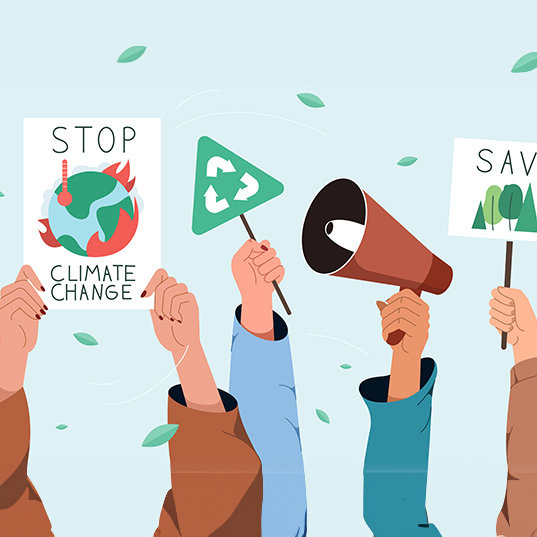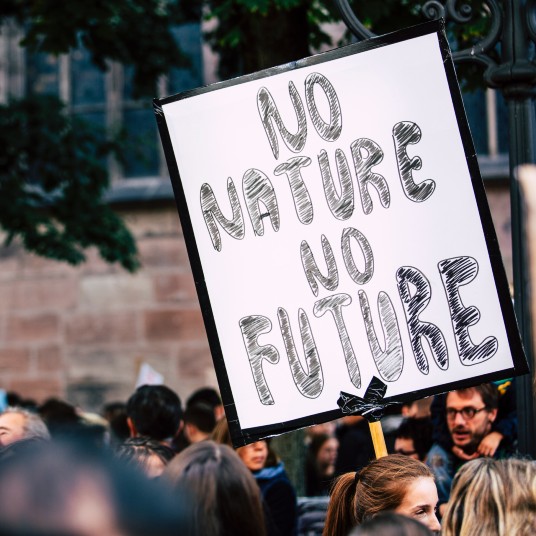In this frenetic and constantly changing world in which we live, concern over the environment and the effects of climate change are increasingly present. Many of us are more and more aware of how our actions can impact on the planet and our physical health. But it seems there’s a piece of the puzzle that is often ignored, that of mental health.
An emerging phenomenon known as ‘eco-anxiety’ is beginning to attract the attention of mental health professionals. This anxiety, borne out of a constant preoccupation for the state of our planet, can have deep, lasting effects on our well-being. Is this a barrier or an incentive when undertaking meaningful actions to mitigate climate change?
What will I learn from this article?
- What is eco-anxiety?
- Who is most likely to suffer eco-anxiety?
- Tips on how to manage eco-anxiety from experts at Yale
What is eco-anxiety and its origin?
Juan is a young man of 25 committed to the environment. He informs himself about the origin of the products he buys, the climate impact of transport modes he uses and the correct ways to recycle the waste he generates.
 Despite his efforts, he feels a constant sense of powerlessness. Each news report on natural disasters, deforestation, species extinction and changes in climate trends causes him great anxiety. He feels overwhelmed by the magnitude of the seemingly unmanageable environmental problems occurring and lives in constant fear of the future facing the next generations. Juan’s story is just one more in a multitude of cases of people now suffering from eco-anxiety.
Despite his efforts, he feels a constant sense of powerlessness. Each news report on natural disasters, deforestation, species extinction and changes in climate trends causes him great anxiety. He feels overwhelmed by the magnitude of the seemingly unmanageable environmental problems occurring and lives in constant fear of the future facing the next generations. Juan’s story is just one more in a multitude of cases of people now suffering from eco-anxiety.
Eco-anxiety, otherwise known as ecological anxiety, is a term used to describe the feeling of anxiety caused by climate change and environmental degradation. Although anyone can experience this, it has been particularly observed in young people, those increasingly aware of the environmental challenges facing our planet.
“Eco-anxiety, otherwise known as ecological anxiety, is a term used to describe the feeling of anxiety caused by climate change and environmental degradation”
The causes of eco-anxiety can vary, but often invovless worrying about the impact of climate change on the future, frustration by the lack of political action to tackle environmental problems, and a feeling of powerlessness in the face of the magnitude of these problems.
Who is most likely to suffer eco-anxiety?
Eco-anxiety is concern for the future that can derive from impotence, desperation, guilt or frustration. Although it is neither clinically recognized as a disease, nor included in the latest edition of mental health diagnostical or statistical manuals, there is a consensus that the uncertainty over, and inability to, control of the environmental degradation of our planet feeds ecological anxiety.
Although no one is completely immune, there are certain groups who are more likely to experience feelings of environment-related anxiety.
A study by Australia’s psychology school confirms that eco-anxiety occurs in women and younger generations, who tend to be generally more worried about climate change than men or the over-35s.
As this analysis explains, this could also be due to young people facing a more uncertain future and thus viewing the irreversibility of climate change as a greater threat than older generations.
People with a strong personal connection with nature (including professionals such as naturalists and climate scientists) and those who experience first-hand the effects of the climate crisis are also more vulnerable to eco-anxiety.
Does eco-anxiety paralyze us in the face of climate change or drive us to mitigate it?

The emotions associated with eco-anxiety are usually negative and can affect a person’s mental health, causing stress, anxiety and depression. They can also lead to avoidance behavior, where people prefer not to think or talk about environmental issues, since the effect is too stressful. But, according to the Australian study, it can also have a positive effect, especially when it leads to collective action to combat climate change.
As reported by The New York Times, some experts have pointed out that, for mentally well people, a bout of eco-anxiety could be the driving force for action. Eco-anxiety is something that will persuade people to act positively and try to protect the environment, according to Giampaolo Perna, psychiatrist and anxiety specialist at Humanitas San Pio X Hospital in Milan.
From fear to action: tips on managing eco-anxiety from experts at Yale
Is there a way to manage the emotional impact of climate change awareness? Anthony Leiserowitz, director Yale’s climate change communication program and senior scientific researcher at the university’s environposmental faculty, and Sarah Lowe, clinical psychologist and associate professor in its public health faculty, proe several strategies.
The first thing is to undertake a media diet. Experts warn of the effect of being constantly exposed to news about climate disasters or the uncertain future of the planet. It doesn’t mean trying to avoid information about climate change, though. There is a difference between knowing the facts and reading important articles and being exposed to the same images and stories over and over again.
They emphasize that taking part in collective action is also important in mitigating eco-anxiety. It can have many benefits, including social connection with people who share similar aims and values, says Lowe, in the Yale article.
Their investigation also found that individual actions, such as recycling or turning off lights, do not reduce climate anxiety to the same degree as collective actions. Taking measures over climate change is really one of the most powerful ways of combating desperation and helplessness, Leiserowitz advises. Doing something, not individually, but as part of a group.
Eco-anxiety is a natural emotional response to the threat posed by climate change to our planet and our existence. Although it can undermine our wellbeing, it also has the potential to act as a powerful driver of change if channeled properly. The key is in having sufficient resources to be able to convert it into action and a commitment to the environment. It has never been more important to protect our planet and, in doing so, our mental health.
Sources:
- https://www.sciencedirect.com/science/article/pii/S2667278221000444#bib0005
- https://sustainability.yale.edu/explainers/yale-experts-explain-climate-anxiety
- https://www.sostenibilidad.com/cambio-climatico/ebullicion-global/